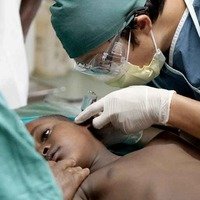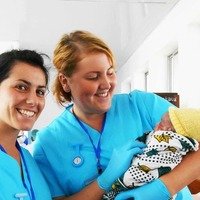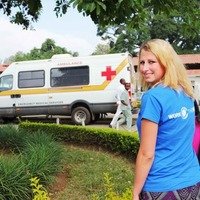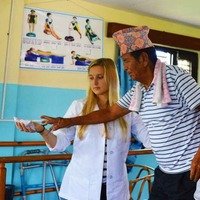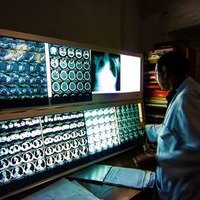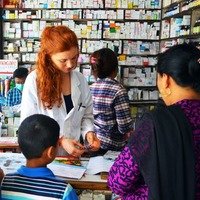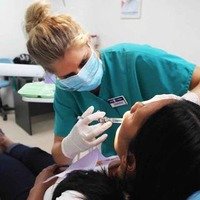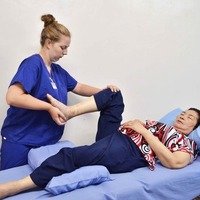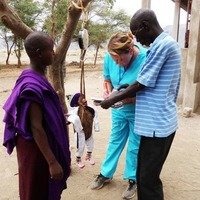A clinical placement abroad is an opportunity to travel to the developing world and undertake a placement in a healthcare system completely different from what you are used to at home. On a clinical placement like this, you’ll see the challenges local staff face when their hospitals don’t have the funds they need.
While abroad, you'll also get the chance to see staff shortages, a scarcity of even the most basic equipment, and practices that differ from what you’ve learned.
If you decide to do your clinical placement overseas, you can choose from destinations in Asia and Africa. And whether you're a student or looking for a professional placement abroad, we'll create an experience tailored to your interests.
Medical Electives
When it comes to your medical elective abroad, you can choose to rotate through general medicine, surgery, A&E, ICUs, anaesthesiology, OBG, and paediatrics…
And in terms of settings, you can spend time in teaching hospitals, regional hospitals, large government hospitals, tertiary referral centres, specialist hospitals, and small rural health posts on your elective abroad.
Midwifery PLACEMENTS
Do a midwifery placement abroad and you’ll come home a changed person. You’ll be amazed at how resilient local midwives are in the face of a lack of hospital funding.
You'll see just how limited prenatal care is, and why that results in more birthing complications than you’d see at home. A lack of funding impacts the quality of care too - many women give birth without pain-relief. You’ll even see some of the fascinating sociocultural beliefs surrounding childbirth.
Paramedic Science placements
On a paramedic placement overseas you’ll see how severe resource shortages affect practices. You could even see patients undergoing procedures like manual intubation without analgesia.
You'll see that primary care doesn’t exist in many low-resource healthcare systems. That means some patients use A&E as a GP surgery, making emergency care that much harder.
Physiotherapy PLACEMENTS
Imagine trying to deliver effective therapies with limited equipment - a daily challenge for physios in the developing world. You'll see this first-hand on your physiotherapy placement.
You’ll see big differences in the basics too. Practices like ECT and TENS are commonly used - and often a first port of call - in many of the destinations we operate in.
Radiography PLacements
As soon as you start your placement you’ll see that equipment and facilities aren’t the same as they are back home. In some destinations X-rays are still developed on film in a darkroom.
On your radiography placement abroad, you'll see there's often limited privacy too, with multiple patients undergoing scans in the same room. And in some destinations, protocols around radiation protection are far more relaxed than you’re used to at home.
Pharmacy Placements
On a pharmacy placement overseas you'll see very different drugs compared to what you’re used to at home, including snake bite antivenoms. You can even travel to rural areas to see traditional herbal medicine being prepared and administered.
You choose where you want to spend time - in stock rooms, specialist satellite pharmacies in oncology or the ED, or in the main pharmacies. Your whole placement is customisable.
Dental elective placements
On a dental elective placement abroad you’ll see resource shortages and outdated equipment as soon as you start your placement. You'll also see patients with extremely advanced decay as many can't afford treatment.
There are big differences in the basics too. In many of our destinations, there’s almost no preventative dentistry. Saving the tooth is a secondary concern as procedures are simply too expensive for most patients.
Occupational Therapy placements
Late presentations and advanced cases are common in occupational therapy placements in the developing world. While you're abroad, you might even see conditions that are rare or don’t exist in your home country.
Don’t forget that occupational therapy is still an emerging practice in most low-resource healthcare systems. That means you’ll see unfamiliar techniques and some treatments being improvised on the spot.
Nursing Placements
This kind of nursing placement is about stepping out of your comfort zone to get new perspectives.
While overseas, you’ll see different cultural attitudes affecting practice. Compared to what you’re used to, the healthcare system will be totally different. You’ll get experience with practices and conditions you’ve never seen before. You choose the departments you want to get experience in - whether your focus is adult, paediatrics, mental health or otherwise.
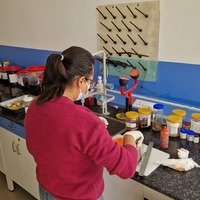 BIOMEDICAL SCIENCE Electives
BIOMEDICAL SCIENCE Electives
On your overseas biomedical science placement, you could get a breadth of course-relevant experience in low-resource hospital laboratory settings. You can get experience in areas including haematology, immunology, microbiology, pathology, biochemistry, pharmacology, virology, immunology...
You could see how infectious and tropical diseases are diagnosed and treated, and gain an understanding of parasitology, all while liaising with related clinical departments to see how conditions are handled at multiple levels.
What do our clinical placements offer?
A Work the World clinical placement gives you the chance to undertake a healthcare placement in the developing world. You will spend time in a low-resource hospital and see unfamiliar practices and advanced conditions. You can even choose the departments you want to rotate through. Learn more here.
What are the benefits of a Work the World clinical placement?
The benefits of our placements and medical electives include:
- Getting invaluable clinical experience in the field
- Making yourself more attractive to employers
- Building your personal and professional network
- Doing some proper travelling
- Sharpening your language and communication skills
What is a Medical Elective with Work the World?
An overseas medical elective is an opportunity to sharpen your clinical skills in a low-resource hospital setting. Our medical electives are based in countries throughout Asia and Africa.
How long is a Work the World clinical placement?
A placement is as long as you want it to be. Our minimum placement duration is one week and there is no upper limit to how long you can travel for. Learn more here.
What is an overseas clinical placement?
An overseas clinical placement is a clinical placement that medical and healthcare students undertake. It can be part of your degree or you can travel in your free time. Learn more here.
How do I budget for my placement abroad?
When budgeting for your placement abroad, you should consider how and where you’d like to travel and which activities you’d like to do during your free time. Top quality food and accommodation (which tend to take up most of students’ budgets) are already included in the price of our placements abroad, so there is no need to worry about those when calculating how much to budget for your trip.
It varies depending on where you go, but you can generally expect the cost of living to be significantly cheaper than in your home country. To give you a rough idea: $200 AUS can typically cover travel to and from placement, weekend trips away, and extra spending money if you are careful with your spending.
How do I prepare myself for a placement?
Before you go on a placement abroad, you should prepare by arranging the necessary vaccinations, visas, and equipment. Work the World will ensure you know what to expect from your placement (including the local weather, hospital rules, and cultural expectations) before your departure.
Why are clinical placements abroad important?
A clinical placement abroad is an opportunity to study a wide range of advanced and unfamiliar conditions. You can also gain insight into how social and cultural issues impact the provision of care, as well as travel around your chosen destination.
How to get the most out of your clinical placement
A clinical placement abroad is a once-in-a-lifetime travel and learning opportunity. Work the World have strong bonds with hospital staff, so you can truly get to know local practices. To make the most of your clinical placement, ensure you show up on time, take notes, and don’t be afraid to ask questions! Evenings and weekends are yours so that you can explore the rich culture outside the hospital as well.
